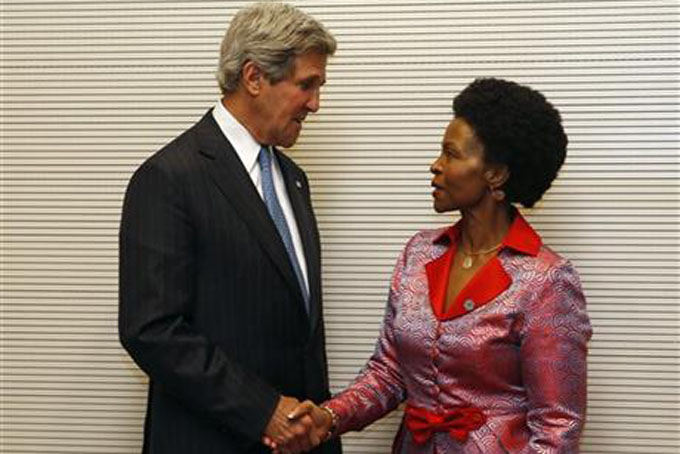
US Secretary of State John Kerry meets with South African Foreign Minister Maite Nkoana-Mashabane in Addis Ababa, Ethiopia, Saturday May 25, 2013. (AP Photo/Jim Young, pool)
by Kirubel Tadesse
ADDIS ABABA, Ethiopia (AP) — The African Union on Saturday marked 50 years since the founding of a continentwide organization that helped liberate Africa from colonial masters and which now is trying to stay relevant on a continent regularly troubled by conflict.
Opening a summit of the African Union in the Ethiopian capital, Addis Ababa, Ethiopian Prime Minister Hailemariam Desalegn said the organization’s original pan-Africanist aspirations remain relevant for a continent where many states are still struggling to overcome rampant poverty and violence.
“This historic day marks not only a great leap forward in the Pan-Africanist quest for freedom, independence and unity but also the beginning of our collective endeavor for the realizations of Africa’s socio-economic emancipation,” he said. “The major responsibility of the current and future generations of Africans is.to create a continent free from poverty and conflict and an Africa whose citizens would enjoy middle- income status.”
AU chair Nkosazana Dlamini-Zuma said the pan-Africanism championed by the organization “united and inspired our people across the continent and globe never to accept oppression.”
The festivities in Addis Ababa, where the organization was born 50 years ago, were attended by dozens of African leaders and foreign dignitaries including U.S. Secretary of State John Kerry and U.N. Secretary-General Ban Ki-moon.
Founded in May 1963 by a handful of liberated African nations, the Organization of African Unity — as it was known then — was at the time preoccupied with ending apartheid in South Africa and colonialism across the continent. Now the AU is focused on Agenda 2063, a blueprint that officials here say will eventually lead to the political and economic integration of Africa. African leaders are expected to discuss this 50-year strategic plan during the summit.
By the 1970s, after almost all of Africa had been liberated from colonialism, the Organization of African Unity set its sights on ending white racist rule in South Africa. The organization granted the African National Congress —the party of Nelson Mandela that has governed South Africa since 1994 —observer status at a time when it was still outlawed by South Africa’s apartheid regime.